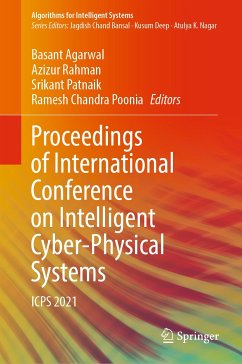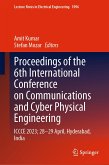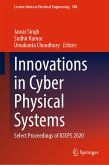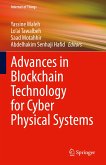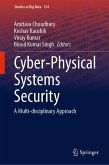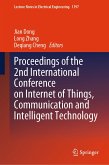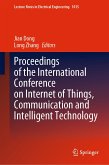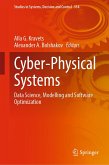Proceedings of International Conference on Intelligent Cyber-Physical Systems (eBook, PDF)
ICPS 2021
Redaktion: Agarwal, Basant; Poonia, Ramesh Chandra; Patnaik, Srikant; Rahman, Azizur
113,95 €
113,95 €
inkl. MwSt.
Sofort per Download lieferbar

57 °P sammeln
113,95 €
Als Download kaufen

113,95 €
inkl. MwSt.
Sofort per Download lieferbar

57 °P sammeln
Jetzt verschenken
Alle Infos zum eBook verschenken
113,95 €
inkl. MwSt.
Sofort per Download lieferbar
Alle Infos zum eBook verschenken

57 °P sammeln
Proceedings of International Conference on Intelligent Cyber-Physical Systems (eBook, PDF)
ICPS 2021
Redaktion: Agarwal, Basant; Poonia, Ramesh Chandra; Patnaik, Srikant; Rahman, Azizur
- Format: PDF
- Merkliste
- Auf die Merkliste
- Bewerten Bewerten
- Teilen
- Produkt teilen
- Produkterinnerung
- Produkterinnerung

Bitte loggen Sie sich zunächst in Ihr Kundenkonto ein oder registrieren Sie sich bei
bücher.de, um das eBook-Abo tolino select nutzen zu können.
Hier können Sie sich einloggen
Hier können Sie sich einloggen
Sie sind bereits eingeloggt. Klicken Sie auf 2. tolino select Abo, um fortzufahren.

Bitte loggen Sie sich zunächst in Ihr Kundenkonto ein oder registrieren Sie sich bei bücher.de, um das eBook-Abo tolino select nutzen zu können.
This book presents innovative work by leading academics, researchers, and experts from industry which is useful for young researchers and students. This book includes selected papers from International Conference on Intelligent Cyber-Physical Systems (ICPS 2021), held at Indian Institute of Information Technology Kota (IIIT Kota), MNIT Jaipur Campus, Jaipur, India, during 16-18 April 2021. The book is a collection of the state-of-the art research work in the cutting-edge technologies related to the artificial intelligence and cyber physical systems.
- Geräte: PC
- ohne Kopierschutz
- eBook Hilfe
- Größe: 11.24MB
Andere Kunden interessierten sich auch für
![Proceedings of the 6th International Conference on Communications and Cyber Physical Engineering (eBook, PDF) Proceedings of the 6th International Conference on Communications and Cyber Physical Engineering (eBook, PDF)]() Proceedings of the 6th International Conference on Communications and Cyber Physical Engineering (eBook, PDF)217,95 €
Proceedings of the 6th International Conference on Communications and Cyber Physical Engineering (eBook, PDF)217,95 €![Innovations in Cyber Physical Systems (eBook, PDF) Innovations in Cyber Physical Systems (eBook, PDF)]() Innovations in Cyber Physical Systems (eBook, PDF)169,95 €
Innovations in Cyber Physical Systems (eBook, PDF)169,95 €![Advances in Blockchain Technology for Cyber Physical Systems (eBook, PDF) Advances in Blockchain Technology for Cyber Physical Systems (eBook, PDF)]() Advances in Blockchain Technology for Cyber Physical Systems (eBook, PDF)121,95 €
Advances in Blockchain Technology for Cyber Physical Systems (eBook, PDF)121,95 €![Cyber-Physical Systems Security (eBook, PDF) Cyber-Physical Systems Security (eBook, PDF)]() Cyber-Physical Systems Security (eBook, PDF)145,95 €
Cyber-Physical Systems Security (eBook, PDF)145,95 €![Proceedings of the 2nd International Conference on Internet of Things, Communication and Intelligent Technology (eBook, PDF) Proceedings of the 2nd International Conference on Internet of Things, Communication and Intelligent Technology (eBook, PDF)]() Proceedings of the 2nd International Conference on Internet of Things, Communication and Intelligent Technology (eBook, PDF)258,95 €
Proceedings of the 2nd International Conference on Internet of Things, Communication and Intelligent Technology (eBook, PDF)258,95 €![Proceedings of the International Conference on Internet of Things, Communication and Intelligent Technology (eBook, PDF) Proceedings of the International Conference on Internet of Things, Communication and Intelligent Technology (eBook, PDF)]() Proceedings of the International Conference on Internet of Things, Communication and Intelligent Technology (eBook, PDF)242,95 €
Proceedings of the International Conference on Internet of Things, Communication and Intelligent Technology (eBook, PDF)242,95 €![Cyber-Physical Systems (eBook, PDF) Cyber-Physical Systems (eBook, PDF)]() Alla G. KravetsCyber-Physical Systems (eBook, PDF)145,95 €
Alla G. KravetsCyber-Physical Systems (eBook, PDF)145,95 €-
-
-
This book presents innovative work by leading academics, researchers, and experts from industry which is useful for young researchers and students. This book includes selected papers from International Conference on Intelligent Cyber-Physical Systems (ICPS 2021), held at Indian Institute of Information Technology Kota (IIIT Kota), MNIT Jaipur Campus, Jaipur, India, during 16-18 April 2021. The book is a collection of the state-of-the art research work in the cutting-edge technologies related to the artificial intelligence and cyber physical systems.
Dieser Download kann aus rechtlichen Gründen nur mit Rechnungsadresse in A, B, BG, CY, CZ, D, DK, EW, E, FIN, F, GR, HR, H, IRL, I, LT, L, LR, M, NL, PL, P, R, S, SLO, SK ausgeliefert werden.
Produktdetails
- Produktdetails
- Verlag: Springer Nature Singapore
- Seitenzahl: 396
- Erscheinungstermin: 24. Januar 2022
- Englisch
- ISBN-13: 9789811671364
- Artikelnr.: 63343605
- Verlag: Springer Nature Singapore
- Seitenzahl: 396
- Erscheinungstermin: 24. Januar 2022
- Englisch
- ISBN-13: 9789811671364
- Artikelnr.: 63343605
- Herstellerkennzeichnung Die Herstellerinformationen sind derzeit nicht verfügbar.
Dr. Basant Agarwal is working as an Assistant Professor at the Indian Institute of Information Technology Kota (IIIT-Kota), India, which is an Institute of National Importance. He holds a Ph.D. and M.Tech. from the Department of Computer Science and Engineering, Malaviya National Institute of Technology Jaipur, India. He has more than 9 years of experience in research and teaching. He has worked as a Postdoc Research Fellow at the Norwegian University of Science and Technology (NTNU), Norway, under the prestigious ERCIM (European Research Consortium for Informatics and Mathematics) fellowship in 2016. He has also worked as a Research Scientist at Temasek Laboratories, National University of Singapore (NUS), Singapore. His research interest is in Artificial Intelligence, Cyber-physical systems, Text mining, Natural Language Processing, Machine learning, Deep learning, Intelligent Systems, Expert Systems and related areas. Professor Azizur Rahman, PhD, is an applied statistician and data scientist with expertise in developing and applying novel methodologies, models and technologies. He is the Leader of the "Statistics and Data Mining Research Group" at Charles Sturt University, Australia. He can assist in understanding multi-disciplinary research issues within various fields, including understanding the individual activities that occur within very complex scientific, behavioural, socio-economic, and ecological systems. Prof. Rahman develops "alternative methods in microsimulation modelling technologies", which are handy tools for socio-economic policy analysis and evaluation. He has more than 120 publications, including a few books. His 2020 and 2016 books have contributed significantly to the fields of "data science and policy analysis" and "small area estimation and microsimulation modelling", respectively. The Australian Federal and State Governments fund his research, and he serves on a range of editorial boards,including the International Journal of Microsimulation (IJM) and Sustaining Regions. He received several awards, including the SOCM Research Excellence Award 2018 and the CSU-RED Achievement Award 2019. Dr. Srikanta Patnaik is presently working as Director of International Relations and Publication of SOA University. He is a full professor in the Department of Computer Science and Engineering, SOA University, Bhubaneswar, India. He received his Ph.D. (Engineering) in Computational Intelligence from Jadavpur University, India, in 1999. He has supervised more than 25 Ph.D. Theses and 60 Master theses in the areas of Computational Intelligence, Machine Learning, Soft Computing Applications and Re-Engineering. Dr. Patnaik has published around 100 research papers in international journals and conference proceedings. He is the author of 2 textbooks and 52 edited volumes, and few invited book chapters published by leading international publishers likeSpringer-Verlag, Kluwer Academic, and other. Dr. Srikanta Patnaik has been serving as the Editors-in-Chief of the International Journal of Information and Communication Technology and International Journal of Computational Vision and Robotics, published from Inderscience Publishing House, England; and International Journal of Computational Intelligence in Control, published by MUK Publication; the Editor of the Journal of Information and Communication Convergence Engineering; and Associate Editor of the Journal of Intelligent and Fuzzy Systems (JIFS), which are all Scopus Index. . He is also Editors-in-chief of Book Series on "Modeling and Optimization in Science and Technology" published from Springer, Germany. Dr. Ramesh Chandra Poonia is an Associate Professor at the Department of Computer Science, CHRIST (Deemed to be University), Bangalore, India. He recently completed his Postdoctoral Fellowship from CPS Lab, Department of ICT and NaturalSciences, Norwegian University of Science and Technology, Ålesund, Norway. He received his Ph.D. degree in Computer Science from Banasthali University, Banasthali, India, in July 2013. He has published more than 60 research articles in refereed journals and international conferences and edited six books and five conference proceedings. His areas of interest are Sustainable Technologies, Cyber-Physical Systems and Intelligent Algorithms for Autonomous Systems.
Chapter 1. Micro Phasor Measurement Unit (µPMU) in Smart Distribution Network: A Cyber Physical System.- Chapter 2. Emerging role of Intelligent Cyber Physical Systems in monitoring stability of engineered and natural slopes.- Chapter 3. Battery Management System in Smart City: An Application of Cyber Physical System.- Chapter 4. Security of Cyber-Physical Systems through the Lenses of the Dark Web.- Chapter 5. Sustainable and Secure IoT-Chain Architecture Integrated with Blockchain Technology.- Chapter 6. LIMBO: Telecom Signal Strength Coverage In Different Regions.- Chapter 7. Path Extraction and Planning for Intelligent Battlefield Preparation using Particle Swarm Optimization, Gravitational Search Algorithm and Genetic Algorithm.- Chapter 8. Smart Green Roof: A Prototype Towards Sustainable Smart Agriculture.- Chapter 9. Identifying Predictors for Substance Consumption Pattern using Machine Learning Techniques.- Chapter 10. Web-based Simulator for Operating Systems.- Chapter 11. AnAnalysis Study of IoT a DoS Attacks Perspective.- Chapter 12. The Effect of Sampling in the Machine Learning based Malware Analysis.- Chapter 13. Operating System Fingerprinting using Machine Learning.- Chapter 14. Comparing HDD to SSD from Digital Forensic Perspective.- Chapter 15. An Efficient Novel for Soil Fertility Evaluation.
Chapter 1. Micro Phasor Measurement Unit (µPMU) in Smart Distribution Network: A Cyber Physical System.- Chapter 2. Emerging role of Intelligent Cyber Physical Systems in monitoring stability of engineered and natural slopes.- Chapter 3. Battery Management System in Smart City: An Application of Cyber Physical System.- Chapter 4. Security of Cyber-Physical Systems through the Lenses of the Dark Web.- Chapter 5. Sustainable and Secure IoT-Chain Architecture Integrated with Blockchain Technology.- Chapter 6. LIMBO: Telecom Signal Strength Coverage In Different Regions.- Chapter 7. Path Extraction and Planning for Intelligent Battlefield Preparation using Particle Swarm Optimization, Gravitational Search Algorithm and Genetic Algorithm.- Chapter 8. Smart Green Roof: A Prototype Towards Sustainable Smart Agriculture.- Chapter 9. Identifying Predictors for Substance Consumption Pattern using Machine Learning Techniques.- Chapter 10. Web-based Simulator for Operating Systems.- Chapter 11. AnAnalysis Study of IoT a DoS Attacks Perspective.- Chapter 12. The Effect of Sampling in the Machine Learning based Malware Analysis.- Chapter 13. Operating System Fingerprinting using Machine Learning.- Chapter 14. Comparing HDD to SSD from Digital Forensic Perspective.- Chapter 15. An Efficient Novel for Soil Fertility Evaluation.
